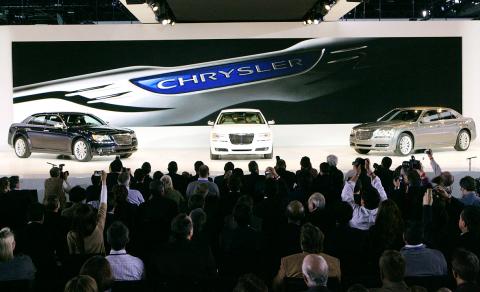The US Department of the Treasury said on Thursday it reached an agreement to sell its remaining 6 percent equity stake in Chrysler to Italy’s Fiat in a deal that will net Washington US$560 million.
The proceeds of the deal include the sale of the US government’s interest in a United Auto Workers (UAW) healthcare trust fund, Treasury said in a mid-evening statement.
US President Barack Obama’s administration invested US$12.5 billion in Chrysler under the Troubled Asset Relief Program in 2009 as part of an auto industry bailout that eventually brought both Chrysler and General Motors Corp through bankruptcy court.

Photo: Reuters
After the transaction with Fiat, Treasury will have received about US$11.2 billion back in principal repayments, interest and canceled commitments from Chrysler.
“Treasury is unlikely to fully recover the difference of US$1.3 billion,” the statement said.
US Treasury Secretary Timothy Geithner said the administration bailout had enabled automakers to mount “one of the most -improbable turnarounds in recent history” that is now creating jobs as domestic automakers gain market share.
Fiat agreed to pay Treasury US$500 million for Treasury’s 98,461 shares of Chrysler. Treasury also had an option to buy shares held by the UAW retiree trust and Fiat agreed to buy that for US$75 million — with Treasury to get US$60 million and the government of Canada US$15 million.
The announcement of the deal with Fiat came on the eve of Obama’s scheduled visit to a Chrysler plant in Toledo, Ohio, where he is expected to tout the success of the auto bailout that saved US jobs and historic auto nameplates like Chrysler.
Treasury said that once the transaction is completed, it will have fully exited its investment in Chrysler. Since the 2007 to 2009 financial crisis ended, Treasury has been making every effort to sell off interests it acquired in industry as part of the rescue effort during those troubled years.
Before Thursday’s announcement, Fiat held a 46 percent interest in Chrysler. That will rise to 52 percent when the transaction is completed and thus give the Italian automaker majority control.
Fiat has made swift work toward that goal in the past six months after meeting certain performance targets and repaying its US$7.6 billion in loans owed to the US and Canada last week.

The US dollar was trading at NT$29.7 at 10am today on the Taipei Foreign Exchange, as the New Taiwan dollar gained NT$1.364 from the previous close last week. The NT dollar continued to rise today, after surging 3.07 percent on Friday. After opening at NT$30.91, the NT dollar gained more than NT$1 in just 15 minutes, briefly passing the NT$30 mark. Before the US Department of the Treasury's semi-annual currency report came out, expectations that the NT dollar would keep rising were already building. The NT dollar on Friday closed at NT$31.064, up by NT$0.953 — a 3.07 percent single-day gain. Today,

‘SHORT TERM’: The local currency would likely remain strong in the near term, driven by anticipated US trade pressure, capital inflows and expectations of a US Fed rate cut The US dollar is expected to fall below NT$30 in the near term, as traders anticipate increased pressure from Washington for Taiwan to allow the New Taiwan dollar to appreciate, Cathay United Bank (國泰世華銀行) chief economist Lin Chi-chao (林啟超) said. Following a sharp drop in the greenback against the NT dollar on Friday, Lin told the Central News Agency that the local currency is likely to remain strong in the short term, driven in part by market psychology surrounding anticipated US policy pressure. On Friday, the US dollar fell NT$0.953, or 3.07 percent, closing at NT$31.064 — its lowest level since Jan.

The New Taiwan dollar and Taiwanese stocks surged on signs that trade tensions between the world’s top two economies might start easing and as US tech earnings boosted the outlook of the nation’s semiconductor exports. The NT dollar strengthened as much as 3.8 percent versus the US dollar to 30.815, the biggest intraday gain since January 2011, closing at NT$31.064. The benchmark TAIEX jumped 2.73 percent to outperform the region’s equity gauges. Outlook for global trade improved after China said it is assessing possible trade talks with the US, providing a boost for the nation’s currency and shares. As the NT dollar

The Financial Supervisory Commission (FSC) yesterday met with some of the nation’s largest insurance companies as a skyrocketing New Taiwan dollar piles pressure on their hundreds of billions of dollars in US bond investments. The commission has asked some life insurance firms, among the biggest Asian holders of US debt, to discuss how the rapidly strengthening NT dollar has impacted their operations, people familiar with the matter said. The meeting took place as the NT dollar jumped as much as 5 percent yesterday, its biggest intraday gain in more than three decades. The local currency surged as exporters rushed to